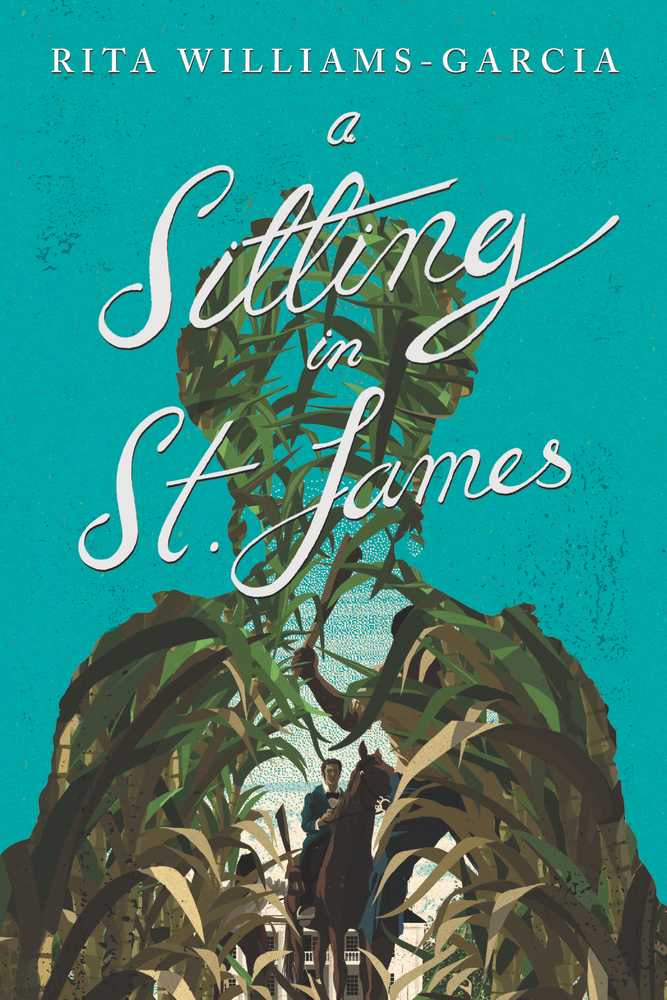Rita Williams-Garcia’s “A Sitting in St. James” (HarperCollins/Quill Tree 2021) is set in Louisiana, 1860, before Southerners believed their way of life could actually be shattered by a civil war.
actually be shattered by a civil war.
The story opens with a bit of Creole bayou history—a culture created by a mix of Indian, French, Spanish, and African peoples. We jump to Sylvie, a young French aristocratic orphan, post Revolution in Paris, 1793, who agrees to marry the under-educated but land-owning and slave-holding American, Bayard Guilbert. One page-turn later, the despicable Madame Sylvie Guilbert is now a widow, upholder of fashionable old ways, and the matriarch of a failing plantation in St. James parish, Le Petit Cottage.
Think: “Gone With the Wind” (time and approximate place) meets “Twelfth Night” (love matches and sly humor) meets “Bridgerton” (sexual identities and love matches), in a world where enslaved people are not seen as human.
Madame’s personal Black servant, Thisbe, named by Madame after a dog, shows the lowly experience of a house-slave (who gets no Sunday off), unable to visit her parents in the slave quarters (who do get Sunday off), who sees nothing, hears nothing, yet—actually observes everything.
Madame’s middle-aged son, widower Lucien, has one living white child, Byron, who is a gay cadet on holiday-leave from West Point who has brought home his lover, cadet Pearce—an easy going Northerner who will inherit his adoptive parents’ fortune. Oh, and Lucien has a gorgeous Black enslaved daughter, Rosalie the recognized half-sister of Byron, who Lucien intends to marry off to a wealthy Black plantation owner’s son, Laurent, to save his own family plantation, Le Petit Cottage. But our Guilbert family is a bit scandalous for the upstanding Black family. See what I mean about the Shakespearean aspect?
The real fun begins when Jane enters. She’s the mannish daughter of a white Creole high-society mother and English father. In today’s parlance we’d say, she was on the spectrum. Madame is tasked to educate the “impossible” girl who has been bribed to learn ladylike protocol against the threat of shooting her beloved horse, Virginia Wilder, who she rides wildly throughout the mornings. Jane shines a light on the ridiculousness of Madame’s manners and protocols and her exchanges with Madame in the hands of Williams-Garcia are uproarious. Jane is most definitely a lesbian in a time when such a thing was so scandalous (and illegal) it couldn’t be mentioned.
Byron (the gay grandson) is betrothed to the lovely clever plantation neighbor, Eugenie, who is not submissive. Eugenie befriends the unique Jane, and for her part has no interest in having sex with her betrothed—after their requisite son is born.
The title refers to Madame’s sitting for a portraitist, LeBrun, who is related to a famous French court portraitist, making the sitting a high prestige venture—for Madame. There is much interacting between this diverse cast—so many secrets to be discovered, with sometimes fascinating outcomes. This epic and masterfully-told tale is a must-read.
Patricia Hruby Powell is the author of the award-winning Lift As You Climb; Josephine; Loving vs Virginia; and Struttin’ With Some Barbecue all signed and for sale at Jane Addams bookstore. She teaches community classes at Parkland College. talesforallages.com
Leave a Reply